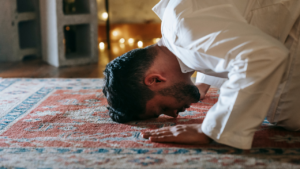
Itikaf is a spiritual retreat practiced by Muslims, typically during the last ten days of Ramadan. It involves secluding oneself in a mosque for a designated period with the sole purpose of worshipping Allah (SWT).
- Seclusion for Worship: Muslims devote themselves entirely to prayer, Qur’an recitation, remembrance of Allah (SWT), and spiritual reflection.
- Following the Sunnah: The practice is based on the tradition (Sunnah) of Prophet Muhammad (PBUH) who would perform Itikaf during the last ten days of Ramadan.
Where it’s Performed:
-
- Mosques: Traditionally, Itikaf is performed in a mosque. It should be a mosque with proper facilities for basic needs and amenities for staying overnight.
- Women at Home: While mosques are generally preferred for men, women can perform Itikaf at a designated and clean space within their homes if attending a mosque isn’t feasible.
Focus on Ibaadat (Worship):
- Prayers: The primary focus is on prayers. Make sure to perform all five daily prayers in congregation at the mosque if possible. You can also offer additional voluntary prayers (nawafil) throughout the day.
- Quran Recitation: Spend a significant amount of time reciting the Quran. You can set a daily target or read continuously throughout the day.
- Dhikr (Remembrance): Engage in ذکر (Dhikr), remembrance of Allah (SWT) through repetitive chants, supplications, and reflections on His attributes and creations.
Hadiths about Itikaf:
- Abu Huraira reported that the Prophet Muhammad (peace be upon him) said, “Whoever observes the ten days Itikaf during Ramadan with steadfastness, seeking reward from Allah, all their previous sins will be forgiven.” (Sahih Bukhari)
- Aisha, the wife of the Prophet Muhammad (peace be upon him), reported that the Prophet (peace be upon him) used to observe Itikaf in the last ten days of Ramadan until he passed away. (Sahih Bukhari)
- It is narrated by Ibn Abbas that the Prophet Muhammad (peace be upon him) said, “He who observes the night prayers on the nights of Ramadan, while in Itikaf, with sincere faith and hope for a reward from Allah, all his previous sins will be forgiven.” (Sunan Ibn Majah)
Self-reflection and Purification:
- Contemplation: Dedicate time for contemplation and reflection on your life, deeds, and relationship with Allah (SWT). Seek forgiveness and make sincere repentance.
- Dua (Supplication): Make frequent supplications (dua) to Allah (SWT) expressing your gratitude, seeking guidance, and asking for blessings in this world and the hereafter.
Maintaining Proper Conduct:
- Minimize worldly interactions: Avoid unnecessary conversations, arguments, or activities that distract from your spiritual focus.
- Stay within the mosque: Itikaf is traditionally observed within the confines of the mosque. Unnecessary outings are discouraged.
- Maintain cleanliness: Keep the mosque clean and maintain proper hygiene during your stay.
Itikaf, a Ramadan retreat in mosques, offers a strong otherworldly lift. By zeroing in on petition, Quran, and self-reflection, you develop your association with Allah (SWT), gain information, and accomplish internal harmony. It’s an opportunity to cleanse your heart and arise reestablished.